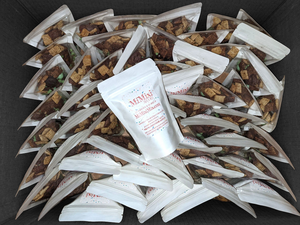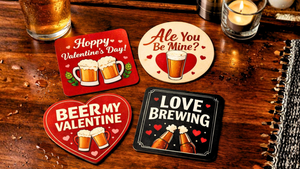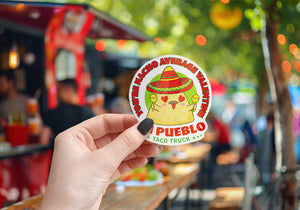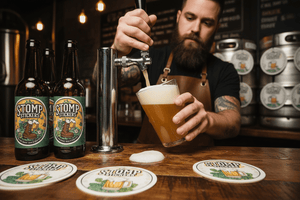How to Legally Sell Your Honey (Without Getting Stung)

Selling honey isn’t just a sweet side hustle—it comes with real rules. Whether you’re bottling for neighbors or prepping for market season, things like kitchen setup, licensing, and labeling all matter.
If you’re gearing up for harvest, here’s how to do it right—plus a look at honey labels that meet the mark when it’s time to jar it up.
Know Your State and Local Laws
Honey laws aren’t one-size-fits-all. In fact, they’re more like a patchwork quilt stitched by 50 different state agencies—plus a few counties that like to do their own thing.
Some spots let you sell straight to customers at the farmers market, no fuss. Others? You’ll need a food handler permit, a home kitchen inspection, and maybe even a cap on how much golden goodness you’re allowed to sell.
Your first stop? Contact your state’s Department of Agriculture or your local cooperative extension office. They’ll tell you exactly what’s required in your area. A few good questions to ask:
- Do I need a food handler’s permit or license?
- Can I sell under cottage food laws, or do I need commercial certification?
- Are there restrictions on where or how much I can sell?
- Does my kitchen or packaging need to be inspected?
- What labeling rules does my state enforce?
Getting this part right up front saves a lot of headaches (and potential fines) later on.
Cottage Food vs. Commercial Production
If you’re a hobbyist beekeeper selling a few jars on weekends, you might fall under your state’s cottage food laws. These usually let you make and sell honey from your home kitchen—no fancy setup, no health inspector showing up unannounced.
But once you start scaling—selling in stores, shipping online, or wholesaling—you’re not in hobby mode anymore. You’re in commercial territory, and that means rules, red tape, and a checklist that’s longer than your honey dipper.
Cottage Food Might Let You:
- Make honey at home without a certified kitchen
- Sell directly at markets, roadside stands, or pop-ups
- Skip the full license-and-inspection routine
Commercial Production Usually Means:
- Using a certified kitchen (and proving it)
- Passing health inspections and food safety training
- Getting licensed as a food producer
- Following more complex packaging, tracking, and shipping rules
Pick your path early. It’s easier than backpedaling after you’ve already printed a thousand labels. Therefore, know which path you’re on before you order 500 jars and a square payment reader.
Labeling Requirements (Yes, They’re a Big Deal)
Even if your honey is the purest in town, the label still has to follow some rules. At minimum, you need:
- Product name (“Honey”)
- Net weight (in both ounces and grams)
- Contact information (name and address)
- Ingredients (if anything is added)
Claims like “organic” or “raw” come with extra baggage—like certification or strict handling practices.
For the full scoop on what your label needs (and what to skip), check out our honey label requirements page or download our free PDF below. It keeps things clear, compliant, and zero percent confusing.
Packaging Dos and Don’ts
Your honey deserves clean, safe packaging—and so do your customers.
- Use food-safe jars and lids (BPA-free and tamper-evident seals are a bonus)
- Sanitize everything: jars, lids, spoons, tools
- Avoid reusing commercial containers (not just risky—often illegal)
Food safety isn’t just good form. In many states, it’s the law.
Registering as a Business
Even a backyard side hustle might need a bit of paperwork. That can include:
- Registering your business name (DBA or LLC)
- Getting an EIN (Employer Identification Number)
- Applying for a state/local business license
- Collecting and remitting sales tax
Your local small business office can help walk you through this. It’s less intimidating than it sounds—and once done, it makes you look and operate like a pro.
Selling Online vs. In Person
If you’re selling at farmers markets or roadside stands, you’ll likely fall under cottage food laws. But selling online, especially out-of-state, is a different story.
You may need:
- FDA facility registration
- Packaging that’s compliant for shipping
- A good read of your e-commerce platform’s food product policies
In short: check the rules before launching your online shop or shipping to that honey lover three states away.

Advertising Claims That’ll Get You in Trouble
Your honey might be magic, but your label can’t legally say so.
Steer clear of unapproved health claims like:
- “Cures allergies”
- “Boosts immunity”
- “Anti-viral”
Safe, legal alternatives include:
- Raw
- Unfiltered
- Wildflower
- Locally harvested
And if you’re going to say “organic,” make sure you’re certified. Otherwise, it’s just a sticky situation waiting to happen.
Insurance and Liability
Thinking about selling at events, in stores, or online? It’s a good time to look into product liability insurance. Accidents are rare—but if something goes wrong (like a mislabeled jar or an allergic reaction), having coverage can save your business from serious financial fallout.
In fact, many farmers markets, festivals, and retailers won’t even let you set up a booth or get on shelves without proof of coverage. Some will ask for specific policy details or additional insured forms as part of their vendor requirements.
It’s not the fun part—but it’s part of doing things above board. And for the peace of mind alone, it’s worth checking out before your next big batch hits the table.

What Successful Small-Scale Sellers Actually Do
Rules are one thing—making them work in practice is another. Here’s what we’ve seen small honey sellers do to keep things simple, legal, and smart:
- Start small and local. Test your product and process at local markets before expanding online.
- Stick to one jar size at first. It simplifies pricing, packaging, and labeling.
- Keep label copy short and clear. Something like “Raw. Local. Wildflower.” reads clean and stays safe.
- Get familiar with market rules early. Many require advance permits, insurance, or vendor approvals.
- Use your local extension office. They’re an underrated goldmine for free advice, checklists, and templates.
These aren’t shortcuts—they’re what actually work when you’re juggling bees, jars, and real life.
Why Selling Honey Isn’t Just a Hobby Anymore
- The U.S. produced over 125 million pounds of honey last year (USDA)
- Direct-to-consumer food sales top $3 billion annually—honey is among the most popular items
- Searches for “how to sell honey” spike between July and September
- On Etsy, there are 50,000+ honey-related listings, from raw jars to infused blends
Translation: demand is real, competition is rising, and getting legal isn’t optional—it’s strategic.
Ready to Sell with Confidence?
Once you’ve sorted the legal side of selling honey, packaging becomes the easy part. Whether you’re sharing jars with neighbors or selling at your local market, the right honey labels help you check the boxes—and look good doing it.
At Stomp, you get custom honey labels with instant proofs, free shipping, and a design tool that makes it easy to get it just right. So go ahead—jar it up, label it up, and let’s get you ready to sell.
FAQs About Selling Honey
What do I need to legally sell honey?
Requirements vary by state, but typically include a business license, food handler’s permit, and legal labeling. Start by contacting your state’s Department of Agriculture.
Can I sell honey under cottage food laws?
Often, yes. Cottage laws usually allow sales at farmers markets and local events, provided you follow production and labeling rules.
Do I need to list ingredients on my honey label?
Not if it’s pure honey. But if you add anything (like cinnamon or fruit infusions), yes—ingredients are required.
Can I sell honey online?
Yes, but shipping across state lines may require FDA registration and compliant packaging. It’s a little more complex than in-person sales.
Can I say my honey is “raw” or “organic”?
You can say “raw” if it hasn’t been heated or pasteurized. “Organic” requires official USDA certification—don’t use it unless you’ve got the paperwork.
Do I need insurance to sell honey?
Not always, but it’s a smart move. Some markets or stores won’t let you sell without proof of insurance.
- Nashira Edmiston






















